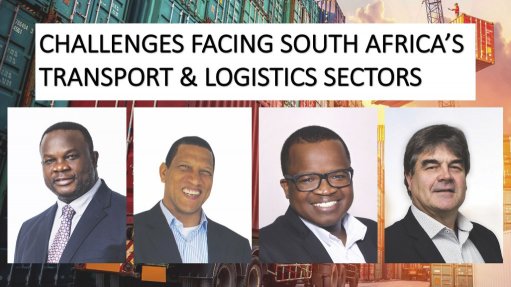
Considering recent developments – such as the Covid-19 pandemic and an economy trying to recover – professional body Chartered Institute of Logistics & Transport South Africa president Elvin Harris says a functioning transport and logistics system is critical to support the recovery of the economy and its future growth.
However, this has proven difficult, as the transport and logistics sector has been facing increasing challenges in relation to maintenance, reliability, efficiency, lack of policy, electricity supply and an increase in organised crime in recent decades.
Harris facilitated a discussion between panel members during a transport- and logistics-focused webinar, hosted by Creamer Media and professional body, the Railway Safety Regulator (RSR) on October 26.
Industry association The Road Freight Association (RFA) CEO Gavin Kelly adds that the availability of finance and the use thereof in a collaborative or coordinated way to ensure transmodal infrastructure is another challenge facing the industry.
In addition, he says organised crime is “beginning to permeate everything” and that electricity supply, or the lack thereof, has been affecting various parts of the logistics chain – whether it be in harvesting foods or processing goods.
RSR safety permits management departmental head Denis Owaga, meanwhile, says the regulator believes that the biggest issue affecting the industry is “the lack of policy to prioritise our goods”.
He emphasises the importance of discussions between stakeholders, noting that the implementation of a policy could “really help to decongest the roads and have goods be moved on a train or whatever it needs to be moved on instead”.
Additionally, Owaga says reliability is critical for success.
Nonprofit organisation the Agriculture Business Chamber of South Africa chief economist Wandile Sihlobo supports comments that organised crime, reliability, efficiency and costs are matters that urgently need to be dealt with, saying these challenges directly affect other industries, like agriculture, which deals in perishable goods.
Maintenance, he adds, has been declining over time, which adds “a certain burden when one thinks about the cost of doing business”.
While a lot of these challenges have been significantly consequential on the system over the past few years, Kelly notes that, post-Covid, “there has been a real drive to improve ports”, with some countries in West and East Africa specifically rebuilding ports “from scratch”.
“Some of them are coming up with novel ideas of creating an almost multinational customer-focused environment, allowing other countries to trade quite freely,” he comments.
However, South Africa has always been considered “the gateway to Africa”, and it is for this reason that Kelly suggests that South Africa may have set the example for the other African countries to learn and develop from.
The challenges, Sihlobo notes, have been “a continuous theme” over the last three years especially.
“It’s on the maintenance and efficiency that we’ve really regressed, and in the long run, it’s going to catch up to us as a country.”
Despite this, discussions have continued between stakeholders to fix or reinvest money into the sector’s maintenance, but Sihlobo comments that the “massive backlogs of maintenance” also impacts on entities' ability to undertake new maintenance projects that would need to be done to invest in the sector’s future.
“It seems to me that efforts have been made to put money in the rail system, maybe less so than our roads system, but in the rail system this money goes into fixing problems and plugging holes. Criminals will keep coming, and while this isn’t across all parts of the country, it is sufficient to dampen the flow of goods,” he elaborates.
“I think by the rule of law, the first [thing] we need to deal with is the crime, [otherwise] whatever money you bring into the system, you will be feeding it into a bottomless pit.”
Owaga agrees with Sihlobo, adding that years ago, the focus was on embracing technology and the Fourth Industrial Revolution to make lives easier. However, this has been “put on the backburner” in the years since, as the industry “needs to address theft and vandalism to protect what’s left, or else there will be nothing left”.
Kelly agrees, stating that “we need to protect what we’ve got, even if it’s broken”.